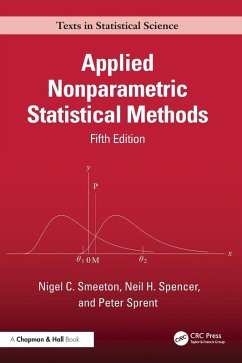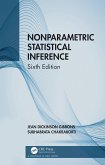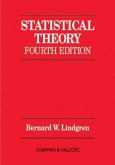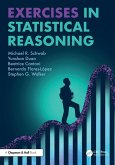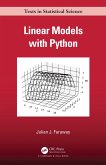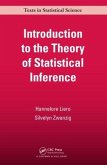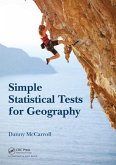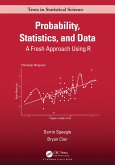Nigel Smeeton, Neil H. Spencer, Peter Sprent (Guy's King & St. Thomas School of Medicine, London, U
Applied Nonparametric Statistical Methods
Nigel Smeeton, Neil H. Spencer, Peter Sprent (Guy's King & St. Thomas School of Medicine, London, U
Applied Nonparametric Statistical Methods
- Gebundenes Buch
- Merkliste
- Auf die Merkliste
- Bewerten Bewerten
- Teilen
- Produkt teilen
- Produkterinnerung
- Produkterinnerung
A comprehensive course text in nonparametric techniques suitable for undergraduate mathematics students. Assumes only basic experience of statistics with algebra kept to a minimum. Ideal for quantitative methods modules delivered to undergraduate or postgrad students in science, business, and health service training.
Andere Kunden interessierten sich auch für
![Nonparametric Statistical Inference Nonparametric Statistical Inference]() Jean Dickinson GibbonsNonparametric Statistical Inference135,99 €
Jean Dickinson GibbonsNonparametric Statistical Inference135,99 €![Statistical Theory Statistical Theory]() Bernard Lindgren (University of Minnesota)Statistical Theory202,99 €
Bernard Lindgren (University of Minnesota)Statistical Theory202,99 €![Exercises in Statistical Reasoning Exercises in Statistical Reasoning]() Michael R. SchwobExercises in Statistical Reasoning77,99 €
Michael R. SchwobExercises in Statistical Reasoning77,99 €![Linear Models with Python Linear Models with Python]() Julian J. FarawayLinear Models with Python95,99 €
Julian J. FarawayLinear Models with Python95,99 €![Introduction to the Theory of Statistical Inference Introduction to the Theory of Statistical Inference]() Hannelore Liero (Germany University of Potsdam)Introduction to the Theory of Statistical Inference71,99 €
Hannelore Liero (Germany University of Potsdam)Introduction to the Theory of Statistical Inference71,99 €![Simple Statistical Tests for Geography Simple Statistical Tests for Geography]() Danny McCarrollSimple Statistical Tests for Geography72,99 €
Danny McCarrollSimple Statistical Tests for Geography72,99 €![Probability, Statistics, and Data Probability, Statistics, and Data]() Darrin Speegle (Department of Mathematics and Statistics Saint LouiProbability, Statistics, and Data118,99 €
Darrin Speegle (Department of Mathematics and Statistics Saint LouiProbability, Statistics, and Data118,99 €-
-
-
A comprehensive course text in nonparametric techniques suitable for undergraduate mathematics students. Assumes only basic experience of statistics with algebra kept to a minimum. Ideal for quantitative methods modules delivered to undergraduate or postgrad students in science, business, and health service training.
Produktdetails
- Produktdetails
- Chapman & Hall/CRC Texts in Statistical Science
- Verlag: Taylor & Francis Ltd
- 5 ed
- Seitenzahl: 462
- Erscheinungstermin: 31. März 2025
- Englisch
- Abmessung: 262mm x 187mm x 34mm
- Gewicht: 1070g
- ISBN-13: 9780367344894
- ISBN-10: 0367344890
- Artikelnr.: 71616327
- Herstellerkennzeichnung
- Libri GmbH
- Europaallee 1
- 36244 Bad Hersfeld
- gpsr@libri.de
- Chapman & Hall/CRC Texts in Statistical Science
- Verlag: Taylor & Francis Ltd
- 5 ed
- Seitenzahl: 462
- Erscheinungstermin: 31. März 2025
- Englisch
- Abmessung: 262mm x 187mm x 34mm
- Gewicht: 1070g
- ISBN-13: 9780367344894
- ISBN-10: 0367344890
- Artikelnr.: 71616327
- Herstellerkennzeichnung
- Libri GmbH
- Europaallee 1
- 36244 Bad Hersfeld
- gpsr@libri.de
Nigel Smeeton commenced his career as the Statistical Assistant at Leeds University in the Department of Statistics, teaching statistics to undergraduate and postgraduate students, and running the statistical advisory service. He then joined the General Practice Research Unit at the Institute of Psychiatry, London, focusing on the modelling of episodes of mental illness, classification of mental illness, and repetition of attempted suicide. Moving to the United Medical and Dental Schools (now part of King's College London), he specialised in stroke and asthma epidemiology. Having established the undergraduate (BDS) course in dental statistics, he wrote the introductory text Dental Statistics Made Easy, which has run to three editions. With Peter Sprent, he co-authored the third and fourth editions of Applied Nonparametric Statistical Methods. He has been Editor of the applied statistics journal The Statistician. He joined the Centre for Research in Public Health and Community Care, University of Hertfordshire in 2013. Having worked in the areas of adolescent behaviour and epilepsy risk, he is currently part of a UK National Institute for Health and Care Research (NIHR) funded team evaluating public health interventions. His statistical expertise and interests include capture-recapture methods, proportional hazards regression, kappa statistics and the historical development of statistical methods. Neil Spencer is Professor of Applied Statistics and Head of the Business Research Unit and Statistical Services and Consultancy Unit in Hertfordshire Business School at the University of Hertfordshire. He completed a BSc in Applied Statistics at the University of Reading before moving to the University of Southampton for an MSc in Social Statistics and then to Lancaster University for a PhD in Applied Statistics. He then became a lecturer at Staffordshire University, where he first became involved in consultancy, and moved on to the University of Hertfordshire. He is a Chartered Statistician. He has undertaken research in a variety of subjects, from Victorian censuses to value-added school league tables, paramedics treating patients whilst wearing protective equipment, health behaviour surveys of school children, compassion in education, creation of family memories, and surveys of gig economy workers across 13 European countries. Consultancy work has included testing the randomness of National Lottery machines (for over two decades), parish plan surveys, appearing as an expert witness, methods for in-service testing of utility meters, and others, for a range of clients large and small. He is author of the books SAS Programming: The One-Day Course and Essentials of Multivariate Data Analysis. Peter Sprent started out as Tutor, then Lecturer in Mathematics at the University of Tasmania, where he taught undergraduate students and provided statistical support within the University and to government departments and agencies. A sabbatical at the renown British agricultural institution Rothhamsted Experimental Station resulted in an appointment at East Malling Research Station, where he focused on the application of statistical methods to agricultural science. Moving to the University of Dundee, he developed the provision of teaching in statistics and headed up the statistical consultancy service within the University. His research areas included statistical regression, the analysis of small experiments, and the mathematics of size and shape. He was appointed to a personal Chair and continued working at the University of Dundee until his retirement, when he was awarded an Emeritus Professorship. He devoted his later life to writing texts, mostly on nonparametric statistics. In addition, determined to raise the understanding of statistics in society as a whole he published the books Taking Risks: The Science of Uncertainty and Understanding Data. With his wife Janet, a botanist, he co-produced the text Nitrogen Fixing Organisms: Pure and Applied Aspects and a guide to the mountains of north-west Scotland.
1. Basic concepts of statistical inference. 2. Fundamentals of
nonparametric methods. 3. Exploring averages for single samples. 4. Other
single-sample inferences. 5. Methods for paired samples. 6. Methods for two
independent samples. 7. Basic tests for three or more samples. 8. Analysis
of structured data. 9. Analysis of survival data. 10. Correlation and
concordance. 11. Bivariate linear regression. 12. Categorical data. 13.
Association in categorical data. 14. Robust estimation. 15. Nonparametric
methods in action.
nonparametric methods. 3. Exploring averages for single samples. 4. Other
single-sample inferences. 5. Methods for paired samples. 6. Methods for two
independent samples. 7. Basic tests for three or more samples. 8. Analysis
of structured data. 9. Analysis of survival data. 10. Correlation and
concordance. 11. Bivariate linear regression. 12. Categorical data. 13.
Association in categorical data. 14. Robust estimation. 15. Nonparametric
methods in action.
1. Basic concepts of statistical inference. 2. Fundamentals of
nonparametric methods. 3. Exploring averages for single samples. 4. Other
single-sample inferences. 5. Methods for paired samples. 6. Methods for two
independent samples. 7. Basic tests for three or more samples. 8. Analysis
of structured data. 9. Analysis of survival data. 10. Correlation and
concordance. 11. Bivariate linear regression. 12. Categorical data. 13.
Association in categorical data. 14. Robust estimation. 15. Nonparametric
methods in action.
nonparametric methods. 3. Exploring averages for single samples. 4. Other
single-sample inferences. 5. Methods for paired samples. 6. Methods for two
independent samples. 7. Basic tests for three or more samples. 8. Analysis
of structured data. 9. Analysis of survival data. 10. Correlation and
concordance. 11. Bivariate linear regression. 12. Categorical data. 13.
Association in categorical data. 14. Robust estimation. 15. Nonparametric
methods in action.

